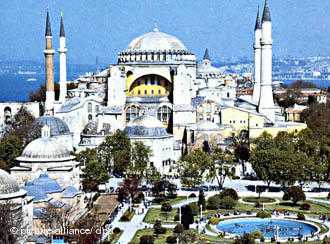Sabrina Tavernise’s article with the title In Turkey, Bitter Feud Has Roots in History in the June 22, 2008 issue of New York Times immediately fueled the existing debate in Turkey over the country’s political future. From the whole article alone the quote from Dengir Mir Firat, the Vice-President of the ruling AKP that ‘the Turkish society has been traumatized’ by Mustafa Kemal Ataturk’s social reforms made it to the headlines, which is hardly surprising as Mr.Firat has been a front-runner in provoking discussions on the foundations of the Turkish Republic.
On the whole the article seems to be all too quick a wrap-up of an otherwise quite ambitious title and too brief an account of things it appears to have insight into; very typical of most western media channels which don’t seem to have time for adequately analyzing the roots of socio-political phenomena outside their borders. Ms. Tavernise’s report relies heavily on the viewpoint of the ‘liberals’ of Turkey who actually belong to some of the most privileged socio-economic tiers of society themselves. Ironically she looks at the very elite of Turkey who benefits immensely from supporting unquestioningly the roles the western capitalist world would like to assign to their country. This self-righteous group of intellectuals has had the best and most direct access among their fellow citizens to the societies of the West. Many of them graduated from its universities or attended foreign private high schools in Turkey. There is a strong bond between the Western policy-makers and Turkish liberals. It is therefore hardly surprising that many reviews from the West on Turkey quote them often to vindicate their pre-formed opinions.
Turkish liberals are convinced that the political tug-of-war is between the ‘secular’ elite of the country (i.e. the state bureaucrats and the armed forces) who has actually run the country for decades and the ‘democratic’ representatives of the ordinary people who happen to have always been conservatives across the board. Jounalists from abroad tend to accept this explanation without giving it a second thought.
Such an effort to simplify matters and make the issue digestible to the foreign public opinion leaves a considerable part of the electorate out of the equation. After all, 53% did not vote for AKP in the July 22 elections of last year. Among the 53% were also the white-collar and middle-class tax payers, many of them women, for example, who appeared in millions in pro-republic demonstrations in the spring of 2007 against the move by the governing AKP to appoint either the prime minister himself or one of the other two leading members of the party to presidency – thus removing another leg of the checks and balances of the system. So there is more than ‘the old guard’ rhetoric to be taken into account when millions of people are alarmed by the acts of the AKP government which steer the country toward a climate reminiscent of the final dark years of the Ottoman Empire in the beginning of the 20th Century: ‘The sick man on the Bosporus’ up for grabs by the interventionist foreign capital.
With roughly 70% of the market stocks in the hands of foreign nationals, a soaring foreign debt and very high interest rates (just under 20%) one can hardly speak of a country’s sovereignty in economic terms. While the outlook for EU membership is much more bleak than before the signing of agreements by Mr. Erdogan as the head of the AKP cabinet to start accession negotiations, the ‘Islamisation’ of society has gained momentum, making it drift further from its European objectives. Who could argue that the leading EU member states will not capitalize on this fact to use it as a pretext to block Turkey’s membership?
What the liberals mean by AKP’s policies being too ‘rushed’ or ‘fast’ remains unclear in the article: Does it mean that they fully support the social transition towards a dogmatic way of life –starting with the schools- and fear that a large portion of the population will wake up in time to provide opposition? Whatever they think the state prosecutor’s office had no choice but to submit its indictment against AKP to the Constitutional Court on the grounds that one of the inalterable paragraphs of the constitution defining the Turkish Republic as a secular state had been violated by the AKParty. In the end the judges did convict the party of the prosecutor’s charges with an overwhelming majority vote of 10 to 1. The punishment fell short of closing the party altogether, but included withholding half of this year’s state funds allocated to it for election campaigns.
Upon the appeal to the high court the Western spokesmen and spokeswomen had in general acted swiftly in support of AKP against the Turkish Judiciary. They did not seem to be as moved, though, by anti-democratic actions of the AKP government itself such as the labor demonstration which was crushed by violent police action in Istanbul as recently as May 1st, 2008. The divisive ‘you are either with us or against us’ philosophy of the party has also been conveniently overlooked by the media of the developed world. Party loyalty and affiliation to religious groups alone have been the qualifications sought in the appointment of almost every critical position in the state structure. An Islamic version of every interest group whether labor unions or businessmen’s association has been created as an alternative to directly support the party. Not only the Sabah group, but over half of the media force in Turkey is firmly in the hands of AKP-affiliated businesses. Most of the ‘liberal’ journalists are embedded in those channels with fat salaries. Maybe the conflict should actually be characterized as being between Turkey’s liberal elite in alliance with the West and those who stand up for the original values of the republic.
Furthermore other critical ‘peculiarities’ about Turkish democracy remain to be reported: There is still a 10% threshold in the election system, unparalleled by any other European democracy, which not only keeps minority representation out of the parliament, but also bolsters especially the front runner with undeserved additional seats. The law on the formation of political parties also exhibits fundamental flaws such as allowing a party leadership to do away with primaries: The current MPs were all hand-picked by their leaders prior to the elections.
Going back to Mr. Firat’s comments that the country was traumatized by the reforms of the Republic: What exactly were these reforms and why are they currently being relentlessly attacked by Turkish liberals who are the foremost beneficiaries of them? They were basically related to, but far more extensive than the modernization attempts made during the late Ottoman era. At the right time (victory over the invading armies of the West) and under the right leadership (Mustafa Kemal, a master strategist and statesman) the time was ripe to take every bold step toward equality with developed societies of the world.
Turkish reforms took place roughly between right before the proclamation of the republic in 1923 and and the second half of the thirties before Ataturk’s death in 1938. The push for development in education contiued well into World WarII. Not necessarily overnight as the trauma theorists claim. Moreover the whole process was overseen by the elected members of the Turkish parliament.
Thanks to them the idea of the individual as the citizen of the country was secured with equal rights and responsibilities against the law regardless of sex, race, religion or ethnic origin. Consequently the civil code brought women and men to an equal position for the first time. Women also enjoyed the right to vote in elections as well as the right to be elected to the parliament. Being in the heart of the transformation the legislation toward a comprehensive emancipation of the woman may well have caused a ‘trauma’ among those who did not want to relinquish their privileged status in society especially against the female sex which had remained inferior in the traditional Ottoman social structure for centuries!
When the Arabic script was abandoned for Latin in 1928 there were special schools established to re-educate the adults as well as children. If the criticism is directed at people’s being rendered unable to read the holy Koran in its original Arabic, one has to ask himself what percent of the population was literate at the end of the Ottoman Centuries (roughly 7% according to Turgut Özakman, a popular playwright and researcher of Turkish history in the last century). How many of the literates could really understand the holy script when they read it? Besides, as far as Turkish was concerned, the Arabic alphabet did not support many sounds in the language. The reader had to tell from the context alone to make out the true meaning of the word. The Latin alphabet as employed by the reformists provided, on the other hand, a truly phonetic script for the language. The pros and cons of the change were weighed against each other before any action was taken.
The reforms of the early republican era did create the favorable conditions for the emergence of a generation of educated minds who catapulted the country from the verge of oblivion to the doorstep of united Europe. If a similar climate had existed during the Ottoman years, it could have helped rejuvenate the Sultan’s state. But it did not. The founding generation of the Turkish Republic was, after all, brought up in the late Ottoman Society. Its members learned their lesson from decades of wars, lost territories and human trajedy. They had the courage to transform themselves into a modern nation deserving to stand on its own feet. In practice, the reformist steps taken were not without shortcomings or disillusionments, of course.
The fault, then, must lie with the following generations of intellectuals who did not have their parents’ resolve to overcome these shortcomings of their regime. Instead, particularly after world War II, they chose the apparent comfort of leaning against a superpower and receiving aid in wherever there was a shortage. The latest generation of Turkey’s actual (economic) elite therefore, could not have acted any other way than live on in such convenience that is reserved for them in return for inactivity when the rest of the population is kept in the dark.
If Ms. Tavernise had really looked into history carefully, she could have found other aspects of the Turkish experience which may have provided a more comprehensive picture of today’s events than served by her fellow liberals of Turkey.
Ahmet Ergelen, September 2008






